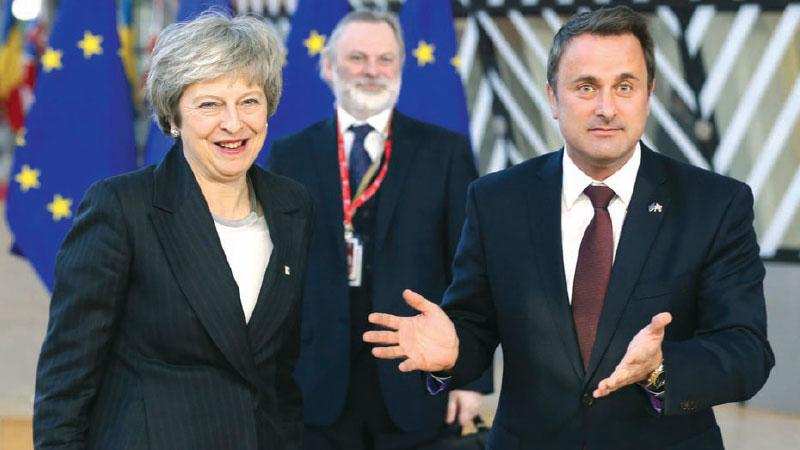
Heads of EU27 appeal to British politicians to be responsible and find solution to impasse
Dec 14: Theresa May has been told to return to parliament and find a way to break the Brexit logjam after she failed to convince EU leaders in Brussels that she had a credible plan to win round MPs.
An appeal from the prime minister for a final concession on Thursday night failed to impress the 27 heads of state and government. The European commission president, Jean-Claude Juncker, described the British debate as “nebulous” and told May to come back to them with a clear plan.
Video footage of the leaders gathering for Friday morning’s talks captured May in a frosty exchange with Juncker, who appeared to be trying to calm a clearly angered prime minister.
Arriving for the second day of the summit, leaders reiterated that they would not renegotiate the deal on the table, and made a direct appeal to British MPs to be “responsible” and offer a way out of the impasse.
Denmark’s prime minister, Lars Løkke Rasmussen, said the EU was being “as flexible as we can be. I think it is now up to the British to come together and create a kind of national consensus in order to tell us exactly what to do to get this through the British parliament.”
The prime minister of Luxembourg, Xavier Bettel, said the discussions with May had been an “honest exchange”.
“Theresa May is clear, but the fact is that Westminster is not that clear. So we know what Theresa wants, and she wants the best possible deal in Westminster, but the problem is the MPs in London,” he said.
“For internal political reasons some people want to gamble with the relations between the European Union and the UK for the future, and it is bad.”
The UK’s prime minister had pinned her hopes on a last-ditch effort to persuade the European Union to work with her in devising a legal guarantee, known as a “joint interpretative instrument”, that she believes could get her Brexit deal through parliament.
The British government is seeking to place a duty on both sides to try to get out of the Irish backstop within 12 months of it coming into force, a proposal supported by Germany’s Angela Merkel and the Austrian chancellor, Sebastian Kurz.
But it was opposed by Ireland, France, Sweden, Spain and Belgium, who voiced doubts that May would be able to sell the technical concession to hostile MPs in Westminster.
Arriving for the morning’s talks on eurozone reform, Kurz offered May a glimmer of hope that leaders could still be convinced to provide her with the legal guarantee she sought.
“I think that it was good that we told Theresa May once again that we will not reopen the withdrawal agreement,” he said, “but besides the withdrawal agreement there is a huge understanding on the wish to find a way to deal with Brexit.”
However, EU diplomats said May had come to the summit without a plan that Brussels believed could convince enough MPs to back the withdrawal agreement, including the thorny issue of the backstop.
Downing Street sources said there would be “plenty to discuss today” with the EU leaders, although Brexit was not formally on the agenda. The summit communique published on Thursday night was less generous to May than earlier drafts. Irish objections had resulted in the removal of a phrase that the EU “stands ready to examine whether any further assurance can be provided” on the backstop.
Wording that the backstop would not be “a desirable outcome” was also cut from the text.
Leo Varadkar, the Irish taoiseach, said he was “very satisfied” with the statement and the Croatian prime minister, Andrej Plenković, insisted the British prime minister had not been treated unfairly. He said: “I think it was a very constructive approach by the council. I didn’t see really any hard time in the meeting where she was present or afterwards.
“We have sent another signal of what was already said on 25 November, very clearly insisting on the negotiated solution.
“I think the text that we agreed on yesterday was a solid signal, first of all to the prime minister, and to MPs in the Commons. Now the responsibility is on the UK side. First we need to see how things will evolve when it comes to the vote.” The UK had hoped for a January summit, where the legal instrument sought by the prime minister could be signed off before a vote in parliament. Asked about such a meeting, Klaus Iohannis, the president of Romania, told reporters: “No, I do not expect it [a summit in January], we expect positive votes from the British parliament, not a summit.”
-theguardian.com
